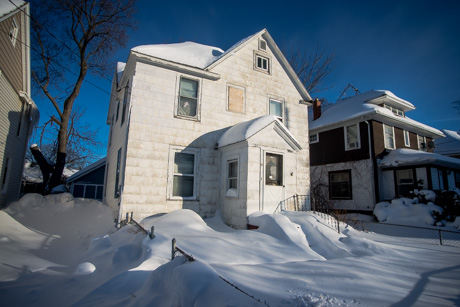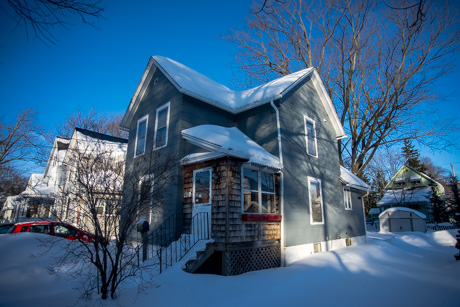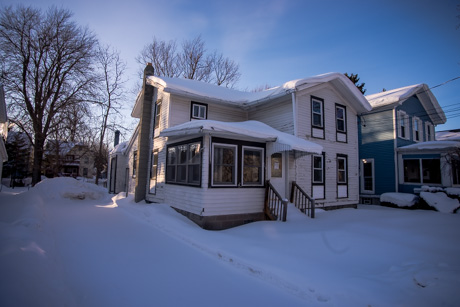
The modest yellow house at 420 North St., Batavia, was probably somebody's dream home in 1930.
Today, it's emblematic of the difficulties the City of Batavia faces in dealing with abandoned and vacant homes.
There are somewhere in the neighborhood of 50 such homes in Batavia and City Manager Jason Molino thinks it's an important enough of a problem that he would like to spend more time during his work days on the issue in 2015.
Vacant and abandoned homes can attract squatters. They serve as eyesores for neighborhoods. They bring down property values for surrounding residents. They are safety hazards. They can contribute to economic decline. They use city resources without contributing revenue or economic impact to the city.
It's important that vacant and abandoned homes be returned to the housing stock quickly. That's one reason the city is getting aggressive with banks that hold mortgages, and in some cases even hold title, by putting pressure on them to deal with code enforcement issues.
Today, six banks were summoned to City Court to answer to code violation citations.
Three banks were to be represented by attorneys when their cases were called. One bank previously received an adjournment of its case because the property will soon be sold. And counsel for two banks didn't show at all.
One of those was Bank of America, the bank the city identified as responsible for the quaint 1,600-square-foot house at 420 North St.
After court, The Batavian reached out to Bank of America and our call was returned by Rick Simon, a California-based spokesman for the bank.
Simon said that Bank of America is not responsible for 420 North St.
He referred us to Rushmore Loan Management Services in Irvine, Calif.
A spokeswoman for Rushmore quickly returned our call, but said she needed time to research the property before responding to questions.
The confusion over who is responsible for the property is exactly the sort of problem the city runs into as it tries to deal with vacant and abandoned homes.
First, the city must research who the mortgage holder is, whether there's ever been a foreclosure, or if the bank or somebody else ever took title, and then find the right person to talk with about the property.
Often times, Molino said, these big banks aren't even certain what properties they are handling and whether they're now responsible for it.
Simon, with Bank of America, said his company tries to be responsive to municipal governments with troubled properties in their neighborhoods, but it's up to the local officials to contact the bank. They don't know there is a problem unless they're told, he said.
In the case of today's scheduled court appearance for 420 Bank St., Simon couldn't confirm the bank ever even received the summons.
City records indicate the summons was delivered in October to a bank employee in Charlotte, N.C., where Bank of America lists its official headquarters.
The Bank of America employees responsible for these properties, whom Simon could normally check with, the spokesman said, were all off on this Friday afternoon.
After an initial phone conversation, he did further research on 420 North and called back to report bank records show responsibility for 420 North was transferred to Rushmore.
To help smooth away these wrinkles in the accountability process, Molino would like to see the state pass a "zombie law." The law would make it possible for municipalities to hold banks who issued the mortgage on the property accountable for the condition of the property. It would be harder for bankers to throw up their hands and say, "not our problem."
For the most part, however, bankers have been responding to the city's code enforcement efforts.
Of the four properties represented by attorneys in City Court today, all four are either now in compliance or moving toward compliance.
"We are getting some banks to take responsibility for the properties," Molino said. "We're serving papers and finding ways to get them into court where judges are receptive to telling them they have to comply with the code."
Today's successes:
- 35 Manhatten Ave., with Michale Jabloski representing Wells Fargo. Many repairs were completed Feb. 1, though there is still some work to be done. The case was continued to April when the city expects Wells Fargo to be in full compliance.
- 129 Summit St., another Wells Fargo property. Wells Fargo was not aware it was responsible for this property until just recently. The bank is awaiting more information from a code enforcement officer on what work needs to be done on the property. The bank was given until May 15 to bring the property into compliance.
- 6 Manhatten Ave., with Jason Racki representing Ocwen Mortgage. Since Racki's last court appearance on the case, many of the required repairs have been completed, but there is new water damage to the structure that must be repaired. Ocwen has also put the property out for bid and anticipates accepting a bid soon. The matter was continued to May 15.
- 40 Manhatten Ave., with Richard Fay representing Citi Mortgage. There have been previous appearances on this property and some work has been done, such as repairing and repainting the garage door. The chimney has been stabilized and the bank is now putting siding out to bid. The case was continued to May 15.
Also not showing today was HSBC bank, whom the city is holding accountable for 128 Ross St.
Another bank, J.P. Morgan, had its case adjourned in advance because it's about to sell 42 Porter Ave.
Some of these properties, like many vacant and abandoned properties in the city, are worth a lot less than it would cost an investor to buy and rehab the property.
Even if an investor can get the house for a song, he might be looking at spending $50,000 to fix up a place that he can't sell for much more than that, so he's now upside down on the so-called investment.
To help address that problem, Molino is working on a local law that would allow the city to offer tax abatements to would-be homeowners who buy distressed homes and fix them up.
"For every $1,000 paid in taxes, that's $1,000 that can't be paid on a mortgage or for rehabilitation," Molino said. "We're already not collecting taxes on it and at that valuation, the amount of taxes you would collect are miniscule, so why not redirect those taxes to rehabilitation."
A vacant home, Molino said, doesn't have a family in it who is bringing their buying power to our community.
"This is a process we really have to vet and decide whether it's appropriate for some of these upside-down properties," Molino said.
He also thinks there are opportunities to work more with groups such as Habitat for Humanity, Neighborhood Works and Pathstone to help identify people who would be productive homeowners even if they can't afford to buy a home without assistance.
"They have the capital, the overhead, to acquire properties and if they can get them cheaply, they are able to screen for good homeowners and arrange for financing, or they have the financing tools to help people get into homes," Molino said.
The first step, though, is bringing vacant and abandoned homes back into the housing stock, and that's only going to happen to the degree the city is successful in identifying responsible parties and getting them to move the property.
Previously: The problem of distressed properties complex and easy solutions elusive

6 Manhatten Ave.

40 Manhatten Ave.

129 Summit St.

Good to know how this works
Good to know how this works and what is being done. I hope they continue in this direction.
While I agree something needs
While I agree something needs to be done, I have a hard time believing "They bring down property values for surrounding residents". I think this statement is some politician blowing smoke, for if it was true then when your tax bill comes you would see a decrease in your tax obligation. Has anyone seen their tax bill go down because of a neglected property near by? Has anyone ever seen their tax bill go down for any reason? If you have, let us all in on how you did it...
Dave, abandoned properties
Dave, abandoned properties are magnets for squatters, drug flops, etc., all of which does have an effect on the values of surrounding properties on the private market.
As far as the assessed value to set your property tax, that's never effected, as regardless of what you would sell your property for, the town get's the full tax amount based on their assessment.
As someone who owns a home
As someone who owns a home that is surrounded on 3 sides with foreclosed vacant homes, trust me it has lowered my property's market value per my last real estate assessment, to quote the agent " truthfully you have a snowball's chance in hell of selling your home for what it's worth having that next door ... across the street ... a few doors up ".
Brenda, Raymond, thanks for
Brenda, Raymond, thanks for clearing that up for me, makes sense. I hope the powers that be can get some results for you Brenda, it sounds like you need it.